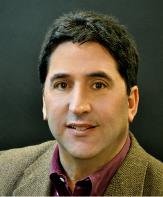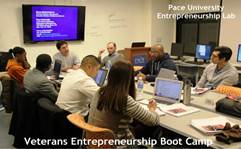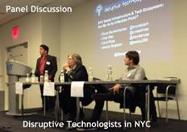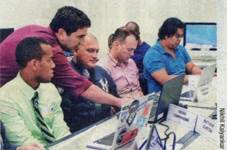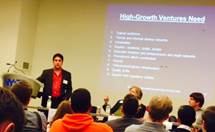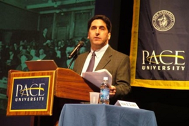
Professor Bruce Bachenheimer
Home
Media
Presentations
Service and Associations
Honors and Awards
Professional Experience
Teaching Experience
Bio (PDF)
Print and Internet 2013-2015

Original Link
Walmart to Vendors: Give Us a Discount
September 28, 2015
By Jeremy Quittner
“To do business with a company like Walmart, vendors are really pushed to the maximum of what they can do,” says Bruce Bachenheimer, a clinical professor of management at Pace University in New York.
1. Consider a currency hedging strategy.
It makes sense, if you’re manufacturing overseas and paying for things using local money, to get a handle on costs by protecting against currency swings. One way to do that is by purchasing a currency contract, known as a hedge, that allows you to exchange dollars into the local currency, but at a fixed price and at a predetermined time in the future.
You benefit if the value of the local currency goes up, but not necessarily when it drops in value. With the strong greenback in recent months, you’re likely to feel some pain. But here’s an additional thing to be wary of, Bachenheimer says: If the currency you’ve hedged decreases in value, and the retailer you supply also asks for a price concession, you’ll take a double hit to your bottom line.
2. Create more flexibility in your overseas production.
While that’s not as easy at it sounds, you could explore adding in other countries that peg their currency to the dollar. That includes many Caribbean nations, suh as Barbados, Antigua, and Belize, Bachenheimer says.


Original Link
Experts: Opportunity lies in Chinese stock collapse
September 3, 2015
By Evan Fallor
While most may see the recent Chinese stock market collapse as an indicator of economic despair, some business experts see it as a golden opportunity for Westchester and Fairfield County firms.Bruce Bachenheimer, a clinical professor of management at Pace University and the executive director of Entrepreneurship Lab — a Lubin School of Business networking and development program — said now is as good a time as ever for local companies to explore opportunities for partnerships and strategic alliances with Chinese companies.
“If I was a Chinese firm and saw this going on, I wouldn’t want to have all my eggs in one basket,” he said. “New York City is the financial capital of the world, and there is a lot of talent here in Westchester County and Fairfield County. I see it as an opportunity for small firms to do business.”
Despite China having the second largest economy in the world after experiencing accelerated growth in recent years, the Shanghai Stock Exchange has been on a downward slump for much of the summer.
Aug. 24, now widely known as “Black Monday” in the financial world, saw the Shanghai main share index lose 8.49 percent.
Calling the U.S. a safe haven economy, Bachenheimer said Westchester’s standing as a wealthy county with large amounts of intellectual capital make it a desirable destination for Chinese companies. Investments in the tech industry would help these firms diversify.
Investors in Westchester, he said, can do one of two things: buy from China, where products and services are less expensive, or conversely, sell to Chinese companies. The selling opportunities, he said, are plentiful in a big market where specialty products may not be impacted by the shrinking Chinese growth rate.
At roughly $10 trillion in gross domestic product, the Chinese economy is still the second largest in the world and has been growing at a very rapid rate for decades. Though the rate is slowing now, it continues to grow. The latest crash does not mean a direct negative impact on Westchester’s small businesses, Bachenheimer said.
“I think, if anything, the Chinese stock market crisis provides more opportunities than stability does,” Bachenheimer said. “They should take these market jitters as an opportunity, not a reason to withdraw into a shell. The Chinese symbol for crisis is the same symbol for opportunity.”

Original Link
What You Can Learn From Carly Fiorina’s Smackdown of Trump
August 15, 2015
By Jeremy Quittner
Her record at Hewlett-Packard, which she led form 1999 until 2005, is controversial at best. Under her leadership, the company’s share price decreased by more than half, she oversaw the layoffs of tens of thousands of employees, and she engineered a merger with computer maker Compaq that resulted in an ugly public feud with Hewlett family members. Fiorina was also ultimately fired by the computer company’s board.
With those things in mind, Fiorina’s strategy then, as now, is closest to something called agency theory, says Bruce Bachenheimer, a clinical professor of management at Pace University in New York.
Loosely defined, it describes the way public shareholders hire agents–such as chief executives–to make decisions for their companies. Sometimes these agents don’t work in the best interests of the company, Bachenheimer says, which could include having a greater appetite for risk than the owners have, because it’s not really their money at stake. And that appetite for risk sometimes increases as a company underperforms, because the agent’s skin in the game–such as stock options–are worth less. So it can cause an agent to aim for the bleachers, in an all or nothing strategy.
“For Carly Fiorina, it was worth taking a risk [in the debates], because the consequences would have been death by a thousand cuts, and becoming completely marginalized,” Bachenheimer say. “By attacking Donald Trump, she could get to five or seven percent in the polls.”

Original Link
The worst thing about tech bubbles isn’t what you may think
July 27, 2015
By Patrick Thibodeau
“It’s often difficult to recognize a bubble while you’re in it, as unreasonable optimism and speculative greed lead to the belief that a ‘new paradigm’ will validate wildly aggressive projections,” said Bruce Bachenheimer, clinical professor of management at Pace University and executive director of its Entrepreneurship Lab. “It certainly appears that certain sectors of the market are due for a major correction,” he said.

Original Link
Pommes Frittes tries to rebuild with a little help from Uber-competitor Gett
July 10, 2015
By Gary M. Stern
Bruce Bachenheimer, executive director of the Entrepreneurship Lab at Pace University, says the rise of the Internet is fostering these co-marketing ventures. “When your only options to promote such partnerships were expensive television, radio or newspaper ads, it wasn’t really a viable proposition,” he says.
With the Internet and social media, companies can join forces and avoid spending expensive marketing dollars.
Moreover, corporate social responsibility is playing a more potent role in consumer choices. When Toms shoes donated a free pair of shoes to the disadvantaged for every pair of shoes bought, it inspired confidence in the company and boosted business.
But some of these partnerships are “publicity stunts” and antagonize customers, acknowledges Bachenheimer.
In the case of Pommes Frites’ disaster, the circumstances were so “out of control, along the lines of an act of God,” that it warranted a charitable outpouring, hints the Pace University professor. Hence, Pommes Frites was considered a worthy recipient for Gett’s assistance.
This partnership could generate attention and business for Gett, which faces a very competitive market in going head-to-head versus Uber and Lyft. Most for-profit businesses assist non-profits, not profitable enterprises, but this situation is a special one.
But Pommes Frites may benefit long after the check is cashed. “It should build brand awareness for a restaurant that many probably didn’t hear of,” Bachenheimer asserts.

Original Link
How to Raise an Entrepreneurial Child
July 5, 2015
By Steve Peha
Talk about value creation. Sounds like a lofty topic, but even the youngest kids can understand value. “Entrepreneurship is really about opportunity and value creation - the ability to recognize, analyze and capture opportunity in order to create value by solving problems or providing benefits,” says Bruce Bachenheimer, clinical professor of management and executive director of the Entrepreneurship Lab at Pace University in New York. “This is important for kids to learn because jobs, and more importantly meaningful careers, are much less about ‘Tell me what to do and I will do my best to accomplish it’ and more about ‘What can you do for me?’ - i.e., how can you create value by capturing opportunity in this position. Focus on recognizing opportunities, discussing how to analyze them, and seeing if there is some way to test how to capture them by trying some aspect of the idea in the real world.”
“Everyone looks to Silicon Valley as a mecca of innovation and entrepreneurship,” said Bruce Bachenheimer, director of the Entrepreneurship Lab at Pace University in New York City. “They have to be here.”

Original Link
Taiwan becomes first Asian nation with Silicon Valley launch pad
June 19, 2015
By Elizabeth Weise
“Everyone looks to Silicon Valley as a mecca of innovation and entrepreneurship,” said Bruce Bachenheimer, director of the Entrepreneurship Lab at Pace University in New York City. “They have to be here.”

Original Link
How to Survive Being an Overnight Success
June 19, 2015
By Neil Parmar
As a company grows, it’s “very difficult for them to maintain that culture,” warns Bruce Bachenheimer, a management professor and executive director of the Entrepreneurship Lab at Pace University.

Original Link
US must support new entrepreneurial ventures to create jobs and remain competitive
May 15, 2015
By Bruce Bachenheimer
During National Small Business Week, Sen. Mazie K. Hirono (D-Hawaii), a member of the Senate Small Business and Entrepreneurship Committee, introduced legislation to help small businesses in Hawaii and across the country grow and succeed.
The United States needs to support new entrepreneurial ventures in order to create jobs, sustain innovation and remain competitive in a global economy. But lumping small business owners and innovative entrepreneurs in the same category will only serve to mask the problem.
Small business and entrepreneurship is not synonymous. Small businesses are certainly an important part of our economy, but they are quite different than high-growth entrepreneurial start-ups.
Small business is not the engine of job growth. The prevailing belief to the contrary is appealing to populist policy makers and small business advocates, but is not supported by analytical research.
Census data demonstrates that young firms, those one to five years old, are responsible for about two-thirds of job creation (Kauffman 2014). And this is not a new phenomenon. David L. Birch studied 5.6 million businesses between 1969 and 1976 and found that two-thirds of net new jobs were created by firms with twenty or fewer employees. Perhaps more importantly, he found that approximately 80 percent of those jobs were created by firms four years old and younger (‘The Job Generation Process’ 1979). While entrepreneurial ventures generally start small, they are intended to scale rapidly. Small businesses generally stay small in support of the owner’s lifestyle.
Small businesses are often founded as an alternative to traditional employment, sustaining a level of income for its founders. An independent contractor, solo-professional, mom-and-pop shop, and family business are examples. Some of these certainly grow to become very large firms that create a significant number of jobs, but those are the exception.
Entrepreneurship is the ability to recognize, analyze and capture opportunity in order to create value by solving problems or creating a bundle of benefits. The three key elements that distinguish an entrepreneurial venture from a small business are a truly new business innovation, a basis of sustainable competitive advantage, and an inherently scalable business model.
High-growth entrepreneurial ventures are needed to transform the economy. A large number of small businesses does not translate into job creation, commercial innovation and national economic competitiveness. With only 3.8% of adults engaged in early-stage entrepreneurial activity, Japan is ranked among the least entrepreneurial economies in the Global Entrepreneurship Monitor (GEM) 2014 Global Report. It is, however, often referred to as a ‘nation of shopkeepers’ (i.e. small business owners), which may explain why it has been in a recession for more than two decades. The nation’s economic success in the 1970s and 80s was largely due to manufacturing efficiencies, which were eventually competed away to the consumer in the form of lower prices. In the end, innovation is the only basis of sustainable competitive advantage.
Unfortunately, for the past 30 years business startups have been steadily declining in the United States (US Census). This is likely due to financing difficulties and a sharp decline in average household net worth, which fell 48% for those under 30 since 2007 (Pew 2014).
SBA guaranteed loans can help small businesses, but will not significantly spur the growth of entrepreneurial start-ups. These firms need private equity investments, something President Eisenhower recognized in 1958 when he signed the Small Business Investment Act, a time when public support for venture capital to promote American innovation was galvanized by Sputnik.
Bachenheimer is clinical professor of Management at Pace University’s Lubin School of Business and executive director of its Entrepreneurship Lab. He was also the founder of a small business, Annapolis Maritime Corp., and co-founder of an entrepreneurial venture, StockCentral Australia.

Original Link
Most Employable Degrees for Business 2015
April 20, 2015
By Francesca Di Meglio
1. Entrepreneurship/Entrepreneurial Studies
People assume that studying entrepreneurship automatically means you’re planning to go into business for yourself. In fact, early on, many questioned whether business schools could even teach entrepreneurship or if the required talents were innate. But today, many employers look favorably at the study of entrepreneurship. After all, companies need people who know how to grow a business.
“These days companies large and small are recognizing the value of an ‘entrepreneurial mindset’ and see the unique value in hiring someone who has a demonstrated interest and commitment to entrepreneurial thinking (i.e., by pursuing a degree in the subject),” says Bruce Bachenheimer, clinical professor of management at Pace University.

Original Link
Pace University’s eLab Provides Crucial Entrepreneurial Education to Veterans
April 10, 2015
With hundreds of military veterans enrolled, Pace University places considerable importance on being responsive to veteran needs. The Entrepreneurship Lab or eLab run by Bruce Bachenheimer is a case in point.
Thanks to a $50,000 grant they received from the Blackstone Charitable Foundation for veteran entrepreneurial initiatives, the eLab runs boot camps to provide veterans with the critical skills they need to pursue entrepreneurship. Pace was one of only six organizations nationwide to receive such a grant out of 200 plus applicants. Needless to say, they feel quite honored by their selection and have a special commitment to the programs they are running for veterans.
“Blackstone is obviously a very prestigious name and they’re doing some important work,” Director of the Pace University Entrepreneurial Lab Bruce Bachenheimer said in an interview. “It’s great to have been selected by them in a competitive process.”
“We don’t just want to take their skills and transition them into the workforce; we want to get them thinking and acting entrepreneurially,” Bachenheimer said. “It’s about unleashing the entrepreneurial mindset, discovering it, and harnessing it.”
Bachenheimer, along with Associate Director Nikhil Kalyankar, teach the courses. Bachenheimer focuses on fundamentals such as marketing, strategy, and entrepreneurship while Kalyankar teaches technical hands-on courses that ground veterans in the current technology that they can apply to their specific business venture.
“For me personally, when I saw the opportunity to provide a service to those who served, it was really rewarding,” Bachenheimer said.

Original Link
After The Sharing Economy – Companies That Connect People In Real Life
April 8, 2015
By Mike Montgomery
Bruce Bachenheimer, the executive director of Pace University’s Entrepreneurship Lab, says that he’s seeing more and more startup businesses that are incorporating a face-to-face element.
“We are social animals by nature,” says Bachenheimer.
In the past, entrepreneurs (outside of dating companies) were hesitant to include a real-life element in startups. Putting people together offline can be messy, and potentially dangerous. It’s hard to give 100% assurance that a driver isn’t going to rob his customer or that a temporary guest isn’t going to smash the place up. But that has been the case for taxis and hotels for decades.
It’s also challenging to scale something that requires human interaction. It’s easier to attract millions of people to click on your website than it is to convince millions of people to share their cars or their homes.
“But now that someone has done it, other people see that it can work,” says Bachenheimer. “Companies like Uber and Airbnb created a perception of feasibility.”
And that hard work put into securing drivers, landlords and chefs pays off in stickiness. Bachenheimer says that once people have committed to a company, it’s less likely they will jump ship to a competitor.

Original Link
Investor-Entrepreneur Discussion Highlights Disruptive Technologists of NYC
April 6, 2015
Bruce Bachenheimer, a Clinical Professor of Management and Executive Director of the Entrepreneurship Lab at Pace University, moderated the discussion.
As posed by moderator Bachenheimer on the issue of just focusing on the venture idea, two of the panelists attempted to provide a more balanced perspective.
During a discussion about Shark Tank, a reality TV entrepreneurship competition, Bachenheimer expressed the importance of the venture’s potential profitability when pitching to investors. Revenue or customer traction and profitability catch an investor’s more quickly than just a “cool” idea.
“The one thing that impresses me is that when the person making the pitch has this idea… [The judges] don’t seem to be too thrilled with the idea or think it’s a cool idea. But then, if they ask about sales or profitability and the person does in fact have real sales and decent profitability, they’re like sharks in a feeding frenzy. They want to be part of it,” said Bachenheimer. “Even when they didn’t think the idea was cool, when they’re able to prove to them that there’s real traction, real sales and real profit; they were very interested.”

Original Link
Execution trumps ideas but immigration can bring in more talent
April 4, 2015
By Dennis Clemente
NEW YORK–Sometimes the title of a meetup ends up being more. You simply need a host who knows how to push the right buttons and no demos.
Last April 1, the Disruptive Technologists group planned a forum called “Balancing a Cool Idea with Profitability” with host/moderator Bruce Bachenheimer, a Pace University professor. It turned out to be about a lot more, including a call for immigration reform to fill up the critical need for developers and other talented people in the United States.
Bachenheimer asked his panel questions that made for an interesting evening at Microsoft’s office at Times Square. It helped that there were no demos, just talk.

Original Link
Bankers, lawyers ready for the return of the dealmakers
February 16, 2015
By Andrew Osterland
“The recovery of M&A is important to the city. It’s usually accompanied by a rising stock market and improving economy,” said Bruce Bachenheimer, a professor of management with the Lubin School of Business at Pace University. “When the bankers make this kind of money, a lot of it gets recycled into the New York City economy.”
“The 2008 crisis was not just another downturn,” said Mr. Bachenheimer. “We need to further diversify the economy.”

Original Link
Team Building 2.0
Q1 2015
By Elaine Pofeldt
Companies of all sizes face challenges such as heightened competition in a more digital and increasingly global marketplace, shorter product lifespans, rapidly evolving technology, and changes in the nature of work that bring more freelance and other flexible talent to their teams, according to Bruce Bachenheimer, a clinical professor of management at Pace University and executive director of its Entrepreneurship Lab.
“You’re seeing much more need for entrepreneurial, faster-moving teams,” says Bachenheimer. “Companies have to be much more agile now.”

Original Link
Conduct your Next Interview as if it were the First
February 2015
By John Rossheim
Devote sufficient time to conduct – and prepare for – interviews. You know from experience (perhaps both positive and negative) that hiring decisions are among the most significant that you make. So allocate proportionate time to the process, especially for interviewing.
“It’s important to slow down,” says Bruce Bachenheimer, professor of management at Pace University. “Small business owners are typically dealing with a myriad of critical issues and many are in a rush to hire.” Consider using an interview guide for better hiring.
Observe their communication style. You may have seen it happen: An otherwise competent hire starts work at a small business and a wave of misunderstandings begets a tsunami of mishaps. Now’s your chance to try to head off such trouble.
“Have the candidate join a staff discussion, react to a difficult test situation, engage in a discussion on an issue important to the team over a casual lunch,” says Bachenheimer. “Carefully observe body language, temper, congeniality and other traits – not just oral communications.”

Original Link
New Journeys
January 27, 2015
By Caren Chesler
In his book, Walden, Henry David Thoreau wrote, “I went to the woods because I wished to live deliberately, to front only the essential facts of life, and see if I could not learn what it had to teach, and not, when I came to die, discover that I had not lived.”
Bruce Bachenheimer, a former derivatives trader for Westpac Banking Corp., said the book and that quote resonated with him, so much so that years after reading it, he felt compelled to leave a well-paying job on Wall Street to go sailing for two years—about the same amount of time Thoreau spent in the woods surrounding Walden Pond.
“That quote stuck in my mind. I knew that whatever I was doing, I wanted to do it deliberately,” Bachenheimer says.
Bachenheimer sailed from New England, through the Caribbean, to South America for two years on a 36-foot Pearson Cutter sailboat that he named “Deliberate.” He then lived on the boat for another three years, though he kept it docked in Annapolis, Md., where he had found a job training companies how to use a new firearms fingerprinting system.
Bachenheimer says it wasn’t that he was unhappy at Westpac, or even at the Bank of Tokyo, where he had worked previously. He liked trading, he found the process interesting and he was making good money.
“I was an officer at the bank, right on Broadway between Wall Street and Pine Street. It was the 1980s. It was an exciting time to be working on Wall Street,” Bachenheimer says.
But something was missing. He didn’t feel like he was living his life to the fullest. His mother had died of cancer a few years earlier, an event he says only reminded him of the fragility of life.
“In hindsight, my mother’s death may have had more of an effect on me than I thought at the time,” he says. “But that poem had always had an impact on me. Living deliberately. It hit home the way 9/11 made people pursue things they were passionate about.”
Now a management professor at Pace University and director of their entrepreneurship program, Bachenheimer is among those who decided to forgo a large Wall Street salary to pursue a passion—though in Bachenheimer’s case, his passion was to live life more fully, more consciously. For others, that passion was a career or hobby, like art or woodworking.

Original Link
Pace University’s Entrepreneurship Lab Awarded Three Grants Supporting Students, Veterans and Israeli Start-Ups
November 18, 2014
“These generous donations will not only positively impact Pace students and military veterans, but will provide benefits to many others through job creation, exciting new product innovations, and innovative service offerings,” said Professor Bruce Bachenheimer, Executive Director of the Entrepreneurship Lab and Administrator of the three grants. “Through the generosity of our donors, we strive to create new opportunities that provide a social benefit and lead to successful and fulfilling careers.”

Original Link
Disruptive Technologists’ Panel Discussed Future of NYC Tech Startup Community
November 17, 2014
By Jeanne Gray
The panel consisted of angel investor and serial entrepreneur David Rose, Chaz Mee, a brand innovation strategist and entrepreneur, and Bruce Bachenheimer, a Professor and Director at the Pace University Entrepreneurship Lab.
Bachenheimer began the evening with a slide presentation of the notable inflection points that have occurred in New York City’s history. He included the 1929 Crash, the City’s virtual bankruptcy in the 1970’s, and the financial crash in 2008. The financial crash directly and adversely impacted the City’s economy which led to changes initiated by the Bloomberg administration. A new course was set to make the City less dependent on the financial industry which the panel felt contributed to the accelerated growth of the City’s tech startup community.
“After the financial crisis, there has been a greater emphasis on non-financial businesses in the City. Also, technology which was previously limited in scope to technology businesses, now runs across almost all business sectors at one time,” said Bachenheimer. As a result technology is being disruptive on a much wider scale in the New York City economy and fostering broader startup formation.
“Additionally, large companies on the east coast are mimmicking the small work environments of the west coast,” noted Bachenheimer. Entrepreneur Mee agreed that a shift to a more entrepreneurial culture in large businesses is another indicator that the City’s tech ecosystem is becoming more similar to Silicon Valley.
Bachenheimer’s slide presentation listed the important elements necessary to spawn high growth ventures. The top three listed were a trained workforce, formal and informal diverse networks, and education in entrepreneurship. All areas that the panel felt New York City has shown depth.

Original Link
The Girl Scout troop teaching girls to be CEOs
November 9, 2014
By Iris Mansour
“These kids can seem more energetic and willing to take a risk than college students,” says troop parent Bruce Bachenheimer, who teaches entrepreneurship at Pace University. He was surprised by their capacity for reflection, as well as their ability to iterate when they hit roadblocks.

Original Link
The Right Stuff
November 7, 2014
By Erika Prafder
At Pace University, through a grant from the Blackstone Charitable Foundation, the school recently launched a Veterans Entrepreneurship Boot Camp. The intensive seven-week program meets regularly at Pace’s Entrepreneurship Lab, a newly launched facility.
The series covers business and entrepreneurship instruction, technical skills and hands-on lab work, says Bruce Bachenheimer, executive director of the Entrepreneurship Lab. Held at Pace’s Manhattan campus, the boot camps are offered to Pace student vets and vets throughout the Tri-State area.

Original Link
Entrepreneurship takes the University by storm
October 29, 2014
By Arize Lee
Undoubtedly, the eLab founded in 2004 (sic), provides students and others with valuable knowledge and capital to pursue entrepreneurial aspirations, but eLab director Bruce Bachenheimer pointed out “It’s not about being an entrepreneurship major.”
“I’m here to bring University students in a collaborative work setting,” Bachenheimer explained. “What I would say to anyone interested, is come to the entrepreneurship lab, look around, ask some questions and apply.”
Through the application, “we understand what students are looking for and match them up with other students interested in doing something similar,” said Bachenheimer.
In addition to the video studio and private meeting room, the eLab has “a 3-D printer, poster printers and Alienware high-speed computers that are great for 3-D modeling and video editing,” Bachenheimer added.
Bachenheimer describes the facility as an ideal environment for anyone to conceptualize, test and launch a business concept. “There’s the space, there’s the equipment and there’s the people,” he said, identifying graduates in the engineering, finance and computing fields that work within the lab.
Bachenheimer warns that “this idea of going to look for a job is a problem. It’s no more, like a generation ago, that you just get hired. Almost all net new jobs are being created by small companies, less than 4 years old with under 100 employees.”
No matter what your occupation, “it’s about recognizing opportunity and creating value,” Bachenheimer stressed. “Pace University’s motto is Opportunitas and nothing is more synonymous with opportunity than entrepreneurship.”

Original Link
NYC Social Infrastructure & Tech Ecosystem: Are We At An Inflection Point?
October 27, 2014
By Danielle Brody
Gone are the days when smart professionals dreamt of being Wall Street bankers, said moderator Bruce Bachenheimer, Director of Pace’s Entrepreneurship Lab. Hustling to start your own company is the new “sexy.” People want The Social Network-type success rather than Bonfire of the Vanities excess.

Original Link
The Online MBA in Entrepreneurship Explained
October 1, 2014
Even though some people argue that entrepreneurship cannot be taught, business schools are giving it their best shot with programs aimed at helping students launch startups. Actually, while most of the coursework is targeting those who want to be their own boss, some programs are also offering general management training and introduction to an entrepreneurial mindset, which can be applied to traditional jobs.
“These skills are important not only for those seeking to establish a new venture, but are increasingly critical in a wide variety of professional careers given today’s hyper-competitive marketplace, where rapid technological innovation and globalization has led to corporate downsizing and a dramatic change in the very nature of work,” says Bruce Bachenheimer, clinical professor of management and director of the Entrepreneurship Lab at Pace University.
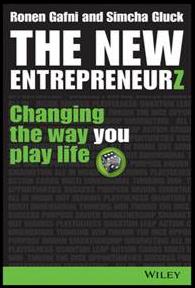
Original Link
The New Entrepreneurz: Changing the way you play life
© 2014
By Ronen Gafni and Simcha Gluck
Pace University Professor Bruce Bachenheimer was profiled in The New Entrepreneurz, a book written by Ronen Gafni and Simcha Gluck, which was published by Wiley in 2014. The profile appears on pages 32 to 35. The following is an excerpt (the profile may be found at http://bit.ly/TheNewEntrepreneurz):
Here’s a story of a Life Hacker, someone who plays many games in life and is an awesome human being as well. We met Professor Bruce Bachenheimer when we prelaunched the FreshBiz workshops in New York City and one of our partners had set up a morning meeting for us.
Bruce started out as a successful Wall Street trader. He remembers the first time he did a trade for a billion dollars in one clip. Everyone viewed him as hugely successful. The sensible thing for him to do would have been to continue making money on Wall Street and live the American Dream. But Bruce, an entrepreneurial thinker, had other plans. Reading Walden; or, Life in the Woods by Henry David Thoreau led him to realize how uninspired he was. He felt that doing more of the same for money and prestige lacked purpose and pleasure. He left his job, bought a boat, learned to sail, and spent the next seven years sailing. He even named his 36-foot yacht Deliberate from a passage in Thoreau’s book. It was his reminder always to live life deliberately, with choice, power, and conviction.
He explained to us how much he loves living the type of life where anything could happen next. This is exactly what we mean by New Entrepreneurz, Life Hackers, and Gamers who play multiple games. We’d love to see more professors like Bruce inspiring students and entrepreneurs through their real-life know-how and not just through classroom knowledge.

Original Link
Owners get squeezed
June 9, 2014
By Anne Field
Meanwhile, as in the nation as a whole, median household income in the New York area has declined recently. As a result, these consumers are watching their pennies—and the companies serving them are feeling it. “The middle-class income squeeze is definitely hurting small businesses,” said Bruce Bachenheimer, clinical professor of management and director of the Entrepreneurship Lab at Pace University.
The situation is particularly acute in New York. “Because of the high cost of living in general in New York, you see these pressures on the middle class even more,” said Mr. Bachenheimer.

Original Link
Facebook Seeks Better Fit With Small Biz
May 7, 2014
By John P. Mello Jr.
Facebook is reaching out to small businesses with a series of summer boot camps designed to load them with expert advice on how to become successful. Of course, part of that advice includes “advertise on Facebook.” This “could really pay off, both in terms of additional revenue and driving interaction between small businesses and their customers on Facebook,” said business prof Bruce Bachenheimer.
The Facebook Fit boot camps can bring home to small business owners how easy it is to reach an audience for their products and services, noted Bruce Bachenheimer, a management professor at Pace University’s Lubin School of Business.
“A big bulk of small businesses are people who don’t use Facebook or only use it casually, so they wouldn’t know how to use it to promote a business,” he told the E-Commerce Times.
“They are a potentially huge, untapped market, and by investing a small amount of money in educating people and training them how to use it – hand-holding them on how to use it – it could really pay off, both in terms of additional revenue and driving interaction between small businesses and their customers on Facebook,” Bachenheimer explained.
“This a bright strategy that could increase small business advertising on Facebook through word of mouth,” he added.

Original Link
BizAsk The Experts: Wallet Wellness Tips
April 3, 2014
By John S. Kiernan
10. Find Your Passion: We’ve all heard others described as never having worked a day their lives – figuratively, of course. Why can’t that be us? The work week doesn’t have to be drudgery; it can actually be fun. You just have to find something you love and leave the less important stuff – exorbitant riches, perhaps – behind. Ultimately, passion is what will help us make it through the tough times that inevitably wait ahead. “If you haven’t found your passion, keep looking, don’t try to force something on yourself or settle for what might be of interest,” Bachenheimer says. “Keep looking for new opportunities and experiences, expand your network, keep your radar on, and don’t settle!”

Original Link
Biz-school courses focus on giving back
March 17, 2014
By Anne Field
Today’s M.B.A.s are well aware that big corporations now expect executives to be conversant in matters related to a company’s broader impact, such as its carbon footprint and practices in vetting its supply chain for human-rights violations—and expect to have access to courses that help them learn this area of business. “This is coming from the bottom up,” said Bruce Bachenheimer, director of the Entrepreneurship Lab at Pace University.

Original Link
White House urges ‘geeks’ to get healthcare coverage, launch startups
March 12, 2014
By Patrick Thibodeau
Bruce Bachenheimer, a professor of management at Pace University and director of its Entrepreneurship Lab, said the White House effort “is a not so thinly veiled attempt to get younger and healthier Americans to register for Obamacare.”
Bachenheimer said this latest effort is in the same vein as President Obama’s recent appearance on Between Two Ferns, a Web-based video show with Zach Galifianakis, on the FunnyOrDie website.
Bachenheimer said the term geeks “may still be perceived with a somewhat negative connotation and not broadly associated with entrepreneurs in general. Meaning an entrepreneur would be the business leader that makes the decision to get coverage, while the geek may be the employee that expects to have coverage at the start-up he or she works for.
“I really believe Marshall McLuhan was right when he said ‘the medium is the message.’ “A canned infomercial on WhiteHouse.gov is not the right medium – think viral,” Bachenheimer said.

Original Link
Ace Grad School, Decades After Your BA
March 6, 2014
By Elaine Pofeldt
Motivated by a desire to get ahead in their careers or pivot into new ones, they bring tremendous drive to their studies, say professors who work with them. “People of typical college age might be going through the motions. Adult students are determined,” says Bruce Bachenheimer, 53, who runs the Entrepreneurship Lab at Pace University in New York (and went back to school for an MBA just before he turned 40).
Embrace Being a Novice Work experience can be a powerful advantage, especially if you’ve road tested what you are studying, notes Bachenheimer. Nonetheless, you’re there to learn—not prove your expertise as you would at work. Giving yourself permission to not know the course material before you walk in the door can help you relax and keep pace with younger students who, without feeling the need to prove their authority, just dive in.
Socialize Your Own Way Joining study groups with fellow students or showing up for career networking activities can help you get more out of any academic program, but it can be tricky for midlife students to navigate other opportunities to socialize.

Original Link
January 27th, 2014 Disruptive Technologists in NYC
February 4, 2014
By Stephanie Lowe
Bruce Bachenheimer, Professor and Director of Entrepreneurship Lab at Pace University, discussed social media uses and growing trends on topics of anonymity and authenticity on the internet. Questions raised by the audience include the role privacy plays to which Bachenheimer emphasized the “importance in developing a means for authentic anonymity” to thrive online. To learn about the Pace University Entrepreneurship Lab, visit their website.

Original Link
The Perils of Starting a Business On Your Own
January 16, 2014
By Elaine Pofeldt
Myopia is another hazard. Without constant reality checks from a co-founder, it’s easy to fall in love with your own plans and waste resources on bad ideas. Setting up an active advisory board of startup veterans can help you avoid that trap, says Bruce Bachenheimer, a management professor who runs the Entrepreneurship Lab at Pace University. He’s talking about the kind of people who will ask in-your-face questions that you–and, later, your employees–might be afraid to pose, such as: “Why are you putting all your time into this?” “How come we’re not going after a different client?” “Shouldn’t we be raising our prices and investing in infrastructure?

Original Link
Also featured in:


Ten tips for making the perfect pitch
January 4, 2014
By Daniel Bukszpan
“You must effectively communicate genuine passion and real expertise,” said Bruce Bachenheimer, director of the Entrepreneurship Lab at Pace University. “Investors know that even truly great business ideas are incredibly hard to successfully execute, so you better convince them you are committed and know what you’re doing if you want their money.”

Original Link | PDF Version
Crowdfunding for investors
December 1, 2013
By Sheryl Nance-Nash
These start-ups represent a new asset class for individual investors, allowing them to diversify and participate in a potentially lucrative sector of the market, says Bruce Bachenheimer, director of the Entrepreneurship Lab and professor at Pace University in New York.
“You could lose your entire investment quickly,” warns Bachenheimer.

Original Link | PDF Version
Young American Entrepreneurs Abroad
November 25, 2013
To provide perspectives on entrepreneurial opportunities abroad, we spoke with Bruce Bachenheimer, clinical professor of management and director of the entrepreneurship laboratory at Pace University in New York, and Katie Davies, senior director of consulting services for High Street Partners, which provides consulting services for international business expansion and operations. Bachenheimer set the stage for our discussion with a parable: “Most who visit an emerging country with high poverty rates only see people with no shoes. Entrepreneurs see an opportunity to sell shoes.” Bachenheimer knows what he is talking about. He went to Australia on a scholarship in 1999 to get his MBA and started a business in his spare time. That business – Stock Central Australia – quickly became the third-largest finance site in Australia and was valued at US$1 million after just one year. He also left his job on Wall Street to sail the Caribbean for a few years, found a partner on the island of Trinidad and started another business importing teak lumber to the United States.
We asked Bachenheimer what the best start-up opportunities are for Americans. “I see a couple of different paths to success for young Americans thinking about starting a business in a new country,” he said. “The first one – and the largest opportunity – is leveraging family or other connections you have in your new country. Very often Americans return to their country of origin or a country where they have spent a lot of time and built up a network of connections. Most often, they set up a business they can bring from the U.S. that does not exist in that country. The second opportunity is what I call ‘opportunistic entrepreneurship.’ I happened to be in Trinidad while sailing the Caribbean and saw an opportunity that had great potential. It turned out to be a great business. The third opportunity is the intentional or deliberate path. For example, China is huge and growing, which is attracting many entrepreneurs who see great potential for new businesses.”
We asked Bachenheimer what the best start-up opportunities are for Americans. “I see a couple of different paths to success for young Americans thinking about starting a business in a new country,” he said. “The first one – and the largest opportunity – is leveraging family or other connections you have in your new country. Very often Americans return to their country of origin or a country where they have spent a lot of time and built up a network of connections. Most often, they set up a business they can bring from the U.S. that does not exist in that country. The second opportunity is what I call ‘opportunistic entrepreneurship.’ I happened to be in Trinidad while sailing the Caribbean and saw an opportunity that had great potential. It turned out to be a great business. The third opportunity is the intentional or deliberate path. For example, China is huge and growing, which is attracting many entrepreneurs who see great potential for new businesses.”
Bachenheimer says that young American entrepreneurs are not moving abroad because of the lack of opportunities at home, but rather are satisfying their desire for an adventure, to experience new cultures and have a chance to live in another country.
Bachenheimer pegs the average age of tech entrepreneurs at 39 and agrees that technology businesses are generally U.S.-based and interested primarily in expanding into new global markets. “International entrepreneurs are definitely younger, free to travel and take risks,” he said. “Those entrepreneurs expanding into other countries, though, tend to be a little older because they have already set up businesses in the U.S. and have the money to expand into new markets.”
Which countries are best for entrepreneurs? Bachenheimer says the United Kingdom, Chile, Ireland, Canada, Australia and New Zealand all have aggressive entrepreneurial programs.
How can young American entrepreneurs improve their chance of start-up success? “I would highly recommend that they do their homework,” Bachenheimer says. “What are the country’s immigration laws as they pertain to working and starting a business? What are the employment rules? What are the tax rules? Do your due diligence thoroughly.”

Original Link | PDF Version
Panel Convenes to Spotlight Universities’ Role in NYC’s Entrepreneurial Ecosystem
November 8, 2013
On Thursday, November 7, Pace University’s Entrepreneurship Lab and the MIT Enterprise Forum of NYC hosted a forum to discuss the significance of universities in today’s rapidly changing ecosystem. Bruce Bachenheimer, Clinical Professor of Management and Director of the Entrepreneurship Lab at Pace University, moderated a panel stacked with those who can speak best to the potential of university collaborations: panelists included NYC Media Lab Oversight Board members Eric Gertler, Executive Vice President for the New York City Economic Development Corporation and Managing Director for the Center for Economic Transformation and Orin Herskowitz, VP of Intellectual Property and Tech Transfer at Columbia University; as well as Debera Johnson, Executive Director, Center for Sustainable Design Studies and Research at Pratt and Geoffrey W. Smith, Director,Center for Technology, Innovation, and Entrepreneurship at the Icahn School of Medicine at Mount Sinai Hospital.

Original Link | PDF Version
MBA Entrepreneurship Centers Reaching Out To More Students
November 5, 2013
The Entrepreneurship Lab (eLab) at Pace University’s Lubin School of Business in New York City also has been pursuing interdisciplinary relationships. The center was opened in 2012, and it intends to support the school’s entrepreneurship classes by offering services and events, and to bring together Pace’s schools of arts and sciences, education computer science, business, and health. When speaking to BizEd, the director of the eLab, Bruce Bachenheimer, observed that the eLab has worked with students who wanted to develop new educational technologies to teach STEM subjects to high school students, and nursing students who want to develop mobile apps.

Original Link
Bright Ideas: B-schools spark entrepreneurial thinking across campus
November/December 2013
By Tricia Bisoux
Building Excitement
Embracing an interdisciplinary purpose brings a sense of excitement to a business school and its entrepreneurial center, says Bruce Bachenheimer, who directs the Entrepreneurship Lab (eLab) at Pace University’s Lubin School of Business. Opened in February 2012 in a building near New York City Hall, eLab’s purpose is not only to augment the school’s entrepreneurship curriculum with events and services, but also to bring together the schools of business, arts and sciences, health professions, education, and computer science and information systems in cross disciplinary problem solving.“I recently met with education students who want to develop new educational technologies to teach STEM subjects to New York City high school students—they call themselves ‘edupreneurs,’” says Bachenheimer. “We’re working with nursing students to help them collaborate with computer science students to develop mobile apps for the field of gerontology. Bringing together students from different colleges has been exciting.”
What Makes a Great Center?
Listen to users. “There’s an old saying, ‘Why give customers what they want when we know what they need?’” jokes Bruce Bachenheimer of Pace University. But he emphasizes that entrepreneurship centers must let users help direct their design. Pace’s eLab is equipped with the latest computer equipment, but it turns out most students “just need big tables, power outlets, fast wi-fi , and a refrigerator.”

Original Link | PDF Version
SEC Opens the Door to Crowdfunding
October, 23 2013
By Erika Morphy
‘Field of Dreams’
Even with the SEC’s cautious approach, however, crowd funding’s appeal will likely translate into, at the very least, dashed hopes on the part of both investors and businesses, Bruce Bachenheimer, a professor of management at Pace University, told the E-Commerce Times.
“While there are many exciting possibilities that could come from the act, I’m afraid it will result in an amateur ‘field of dreams,’” he said – “early startups dreaming of easy funding and nascent individual investors dreaming of big returns.”

Original Link | PDF Version
Also featured in:
Dodge Globe, Finanzen.ch, Fowler Tribune, Galva News, Geneseo Republic, Hamburg Reporter, Journal Star, Nevada County Picayune, Oak Ridger, Philly.com, SC Sun Times, Sussex Countian, and The Daily Republican
Entertaining Clients? Save Your Money
October 9, 2013
By Kathryn Tuggle
“In the 1980s, you couldn’t spend enough money,” says Bruce Bachenheimer, director of the Entrepreneurship Lab at Pace University in New York. “But today clients are saying, ‘Forget the hunting trip, forget the lavish treatment – just give me a better price.”
Client spending – and the perception of what “acceptable” client spending is – has evolved over the past decade, Bachenheimer says. The dot-com crash in 2000 inspired companies to re-examine their investment priorities, and after 9/11 companies saw more urgency in preparing for the inevitable “rainy day.” The “final straw” occurred most recently in 2008, when businesses were forced to pare down to their most essential operating costs – and extravagant client treatment just didn’t make the cut.
“Nowadays there’s just a level of uncomfortability for the giver and the receiver,” Bachenheimer says. “If you’re rolling out the red carpet for a customer, they’re going to assume you have incredibly high margins to do all that spending. They’re going to think, ‘Oh, he’s overcharging everyone – including me – in order to afford all this.”
Some of them may even start to wonder, “Did I sign this contract because I was effectively bribed?” Bachenheimer says.
With that said, a company’s business is much easier to buy than it was just a few years ago, Bachenheimer says.
“American firms spend roughly 10% of their revenue on marketing. That’s not a lot, and gifts and entertainment can eat up a lot of that,” he says. “But when you start looking at how cheap digital marketing is – more importantly, how effective it is – suddenly, spending big money to wine and dine doesn’t seem very cost effective, and companies have realized this.”
But there are always a few exceptions to the rule, Bachenheimer says.
“Companies need to examine the cost of new customer acquisition and the lifetime value of a customer. If you’re forced to compete with a slew of other companies for someone’s business, but that relationship will be lifelong, then it’s worth the extra expense,” he says. “Also, if you’re in an industry where your clients are very high net worth individuals, you’re not going to get their business by going by their home in Greenwich and sticking a flier under the windshield wiper of their Rolls-Royce.”
Another interesting exception is if your client is potentially sitting on the “next big thing,” in business, Bachenheimer says.
“Say there’s a hot new social media company. It could be just a bunch of kids, but if everyone believes it will be the next Instagram or Twitter, then it’s worth getting them on your side,” he says.

Original Link | PDF Version
Also featured in:

Pace Professor Discusses Obamacare’s Impact On Tech Startups
October 4, 2013
By Joe Jenkins
Bruce Bachenheimer, director of the Entrepreneurship Lab at Pace University told computerworld.com that Obamacare could have a positive impact on tech startups.
The director of Pace University’s Entrepreneurship Lab in Pleasantville recently discussed the positive impact that Obamacare could have on tech startups with computerworld.com.
Bruce Bachenheimer stated in the article that people often take jobs that they don’t want just to obtain health insurance. If the Affordable Healthcare Act lowers insurance premiums, it would make health insurance more accessible and therefore make a tech start up less of a financial risk, according to Bachenheimer.
Bachenheimer went on to say that most people that create tech startups are in their late 30s and not in their 20s. People in that age range are willing to take risks on a business idea, but not necessarily on their health. Since a serious illness or a car accident can’t be controlled, some entrepreneurs view the unmanageable risk as too great.

Original Link | PDF Version
Pace Featured In Articles About Campus Resources For Entrepreneurs
October 3, 2013
A new article in Entrepreneur discusses the resources at business schools that can help MBA students on the path to starting and developing their own business, and the article features Pace University’s Lubin School of Business as an example
The article says that business schools can benefit student entrepreneurs by providing them with free or reduced cost technology. To illustrate this point, Entrepreneur talked to Bruce Bachenheimer, the director of Pace’s entrepreneurship program, about the Entrepreneurship Lab. The lab is intended to be a space for students to produce innovative ideas and work with others. The lab provides students with an array of technological devices, including a wide selection of computers (desktop, laptop, and tablet), a 3D printer, advanced software programs, a professional-level video studio, and a surface computer.

Original Link | PDF Version
Also featured in:

You Have a Great Idea. Now What Do You Do?
September 30, 2013 (featured on page A1, appears on pages R1-2)
By Neil Parmar
Signing On for Steady Income
Most of the caveats about outright sales apply here, too, and there’s something else to bear in mind: Some companies include a “best efforts” clause in their licensing agreements, noting that they’ll try to sell as many products as possible. But some companies may interpret that very loosely—if not ignore it altogether. Bruce Bachenheimer, a clinical professor of management and director of the Entrepreneurship Lab at Pace University, gives an example from the gem industry. A conglomerate, he says, may seem keen to license a device that can transform carbon into diamonds—and agree to pay $1,000 for every carat produced. Yet they may take the agreement, “file that in a drawer and never produce a single carat,” he says. “They want to control supply.”

Original Link | PDF Version
Also featured in:



Top Campus-Based Resources for Aspiring College Entrepreneurs
September 30, 2013
By Laura Schaefer
Free or reduced cost technology, software and apps: Access to valuable equipment is a major bonus of being an entrepreneur still enrolled in school. Bruce Bachenheimer, clinical professor of management at Pace University as well as director of its entrepreneurship program, explains one aspect of why his school’s program is so valuable to student startups: “The Entrepreneurship Lab has assembled an impressive collection of technology resources, including high-performance computers, sophisticated software, a professional video studio, a surface computer, and a 3D printer; as well as a wide variety of desktop, laptop and tablet computers.”

Original Link | PDF Version
Also featured in:

Obamacare could help fuel a tech start-up boom
September 30, 2013
By Patrick Thibodeau
“A relatively short stay in a hospital can bankrupt someone,” said Bruce Bachenheimer, a professor of management at Pace University and director of its Entrepreneurship Lab. He said that, anecdotally, he’s seen many people who will take a job they don’t even care about just to get health coverage. “It’s become such an important factor,” he said.
The average age of people who create a tech start-up is 39, and not 20-something,” said Bachenheimer, despite the famous examples created by people such as Steve Jobs and Bill Gates. On top of that, there are twice as many tech start-up founders who are over the age of 50 as those who are younger than 25, he said.
Entrepreneurs are willing to take on risks, but health care is not a manageable risk, said Bachenheimer.
“There is a big difference between mortgaging your house on something you can control, and risking going bankrupt by an illness because of something you can’t control,” said Bachenheimer. No one can predict a car accident or a serious illness, he said.
“Entrepreneurs actually don’t see starting a business as risky as many people think, because they are so confident in their abilities and their idea,” said Bachenheimer. “But they would see going around without health insurance as a risk.”
While Obamacare may lead to an increase in start-ups, there’s another side to the coin. Once a start-up nears 50 full-time employees – the threshold for taking on insurance coverage responsibilities under the law – it might prompt the company to shift people to part-time work and rely more on outsourced contractors, said Bachenheimer.

Original Link | PDF Version
3 Smart Ways to Earn Business Credentials Without an MBA
September 3, 2013
By Ben Weiss
1. Raise your hand.. As Professor Bruce Bachenheimer, the program director for entrepreneurship at Pace University’s Lubin School of Business, explains, “While experiential learning should be part of a traditional MBA program, it is imperative to those seeking to gain critical business skills independently.”
2. Volunteer outside your organization: Perhaps your current career keeps you so boxed in that you can’t find internal volunteer opportunities to refine important skills. As such, you’re considering investing in an MBA to facilitate a career change.
Should you decide you don’t have the time, finances or direction to do so, Bachenheimer suggests developing meaningful business skills outside your firm with nonprofits or the countless other organizations that would welcome free help.
3. Develop a business (no matter the magnitude): Many professionals are attracted to an MBA to become qualified as a manager or strategic director. However, Bachenheimer explains there is likely no better way to illustrate managerial, leadership and business operations credentials than jumping in the fire and starting your own business.

Original Link | PDF Version
The Accidental Entrepreneur
June 21, 2013
By Lauren Keyson
Bruce Bachenheimer, the accidental entrepreneur, is a clinical professor of management and the director of Pace University’s Entrepreneurship Lab. He tells his students that passion is a must for entrepreneurs and that if they don’t yet know what that passion is, they should keep looking. Sometimes it can happen when it’s least expected – and he is a great example of this.
“Passion is very important. When I found a passion for something, whether it was an entrepreneurial venture or something else, it was very important that I pursue it. Where is that passion going to come from? It can come from almost anywhere and at any time. Early on I discovered a passion for Japanese. I found an exchange program and went to college there for a semester. Later, inspired by Thoreau’s Walden, I decided to leave a career on Wall Street and go sailing. And just as Thoreau decided to leave the woods after his path from the cabin to the pond became too worn in, it was time for me to find something else.
“Just over a decade ago I found a passion for teaching and I did what it took to get a teaching position without a typical academic background. Examples of my entrepreneurial passion include having started an online financial services company in Australia and a woodworking business in Maryland. With passion it is very easy to focus all your time and energy and accomplish something.
“When I talk to my students and they don’t know what their passion is, I tell them it’s fine – wait and keep looking, don’t just settle. I lost the desire for my job as a Wall Street trader and was basically just going through the motions. It was exciting and paid a lot of money, but I knew I wanted to do something else, just not what at the time. When you don’t have it, you can’t force a passion on yourself. I think it’s a mistake. But keep that radar open and try a lot of different things because you never know where that passion will come from.”
“Sometimes that one passion can last a lifetime. For me, some things run their course after a couple of years.”

Original Link | PDF Version
The Apprentices: Learn-By-Doing Entrepreneurship At Enstitute
April 17, 2013 (May 6, 2013 print issue)
By Meghan Casserly
Twice a week the housemates cook dinner for a guest speaker. Among them: fashion designer Marc Ecko and Scott Belsky of Behance. Tonight they’re hosting Bruce Bachenheimer, head of Pace University’s entrepreneurship lab. Turns out he quit as a Wall Street trader to sail for several years, then started a teak lumber import company, taught himself boatbuilding, then latched on to high-tech forensics, got an M.B.A., launched a financial website and learned Japanese.
A good entrepreneurial lesson in his story: If you can, exploit every unexpected twist in life.
Life At Enstitute: A Photo Essay
Family Dinner
Twice a month Enstitute hosts speakers–and treats them to a home-cooked meal. Bruce Bachenheimer is the head of Pace University’s entrepreneurship lab.
Bruce Bachenheimer, Man of Mystery
Bachenheimer, who is working on an autobiography, has stories for days. From his official bio: “Bachenheimer began his career as a Wall Street trader then had the courage to take a step back from the rat race and go sailing … for several years. After sailing through the Caribbean to South America, he headed to Annapolis, Maryland, where he launched a business importing teak lumber and taught himself yacht joinery. Bachenheimer then transitioned to a career in high-tech forensic science, where he served as the International Product Manager for an entrepreneurial venture, conducting business in over 20 countries.” Trust he makes for an amazing dinner guest.

Original Link | PDF Version
Delivering the perfect pitch
April 14, 2013
By Lori Ioannou
“In this era of the lean startup, when entrepreneurs must continuously refine their business models in a fast-moving marketplace, these competitions are like rocket fuel,” said professor Bruce Bachenheimer, director of entrepreneurship at Pace University’s Lubin School of Business, which hosts its own business-plan competition.

Original Link | PDF Version
“Shark Tank” Lessons for Entrepreneurs
April 8, 2013
By Angela Stringfellow
1. Shift your focus to attracting other owners. Bruce Bachenheimer, director of the Entrepreneurship Lab at Pace University, says too many entrepreneurs pitch their business with the mindset of getting investors to help them. But investors want to know what’s in it for them, not what’s in it for you. Your focus should be on attracting other owners “by demonstrating real value creation and an acceptable level of risk and return.”

Original Link | PDF Version
6 ways to solve tech talent crunch
February 20, 2013
By Anne Field
“We don’t have a jobs crisis,” said Bruce Bachenheimer, clinical professor of management at Pace University. “We have a skills crisis.”
Last spring and fall, about 700 students attended sessions at seven schools run by representatives of more than 40 startups. “This is a way to take a lot of small companies and leverage them, so you’re recruiting for a collection of cool startups,” said Mr. Bachenheimer. “It’s an economies-of-scale thing.”

Original Link | PDF Version
Also featured in:




Lose the tickets on yourself to make it in the States
January 28, 2013
By Matthew Hall
Lode adds the US is not the super-efficient and best-practice paradise it is sometimes perceived to be, a point that Bruce Bachenheimer, professor of management at Pace University in New York and a board member of MIT Enterprise Forum, believes is dependent on what sector you do business in.
“It’s really about the entrepreneurial ecosystem in regions of the US,” said Bachenheimer, an American who has studied and worked in Australia. “Silicon Valley, Boston and Cambridge, New York City, the Research Triangle in North Carolina, and Austin Texas. Learn how to plug yourself into that.”
Bachenheimer said there’s a difference in American perception between doing business with a company in Australia and doing business with an Australian in the US.
“We see an Australian in America pretty much the way we would view anyone else,” he said. “All kinds of successful businessmen, entrepreneurs, professors, and doctors are from overseas. If they had the wherewithal to make it to the US and are successful, good on them.”
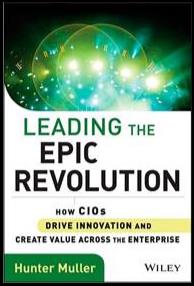
Original Link
Leading the Epic Revolution: How CIOs Drive Innovation and Create Value Across the Enterprise
© 2013
By Hunter Muller
Pace University Professor Bruce Bachenheimer was profiled in Leading the Epic Revolution, a book written by Hunter Muller, which was published by Wiley in 2013. The profile appears on pages 55 to 57 and 221 - 223. The following is an excerpt (the profile may be found at http://bit.ly/ProfessorOfInnovation):
Professor of Innovation
I was recently introduced to Bruce Bachenheimer, Clinical Professor of Management at Pace University’s Lubin School of Business and Director of the University’s Entrepreneurship Lab. I think it’s fair to say that Bruce lives and breathes innovation and entrepreneurship. A serial entrepreneur himself, Bruce is an expert on the important role that innovation plays in business growth.
In a lengthy interview, Bruce outlined some of the reasons he’s passionate about innovation and entrepreneurship. Here’s a brief summary of what he said in the interview:
“As Thomas Friedman says, the world is flat. Countries compete on a much more equal basis that in the past. On a national level, the only sustainable competitive advantages come from innovation.
“Competing on the basis of low labor costs is a temporary strategy. It’s a race to the bottom and it won’t keep you competitive in the long run. Nations with high standards of living, low unemployment, trade surpluses and general prosperity tend to compete on innovation.
“For a while, it seemed like Japan’s strategy of competing on the basis that manufacturing efficiency was a winning strategy, but the gains they achieved disappeared as competition drove down prices, which benefited consumers, not manufacturers. It was a temporary victory, and now they’ve been in a recession for nearly two decades.
“If you look at countries that are leaders in innovation – the U.S., Australia, New Zealand, Israel, and the countries in northern Europe – you see high levels of education and high levels of entrepreneurship. In Japan, for example, the culture and regulatory system make it very difficult for entrepreneurs to succeed. If you are an entrepreneur in Japan, you face a lot of barriers. As a society, Japan is very intolerant of failure. That fear of failure stops people from taking risks, and you need to take risks to succeed as an entrepreneur.
“On the other hand, countries like the U.S. and Israel are much more tolerant of failure – especially when you fail on someone else’s dime. Failure isn’t exactly a badge of honor, but it’s not the end of the world either. In the U.S., when someone’s business fails, people are likely to say, “That guy really learned a lesson. He sure won’t make that mistake again.” People in entrepreneurial cultures tend to see failure as a learning experience.
“Company cultures have a similar impact on innovation. Companies that encourage innovation and tolerate a certain amount of failure are more likely to be the serial innovators.”
I love how Bruce puts innovation and entrepreneurship into context, and shows us the impact of innovation on multiple levels. Bruce also advises his students to think like innovative entrepreneurs when envisioning their career paths. In today’s rapidly evolving and ever-changing economy, I think that’s excellent advice for all of us.
